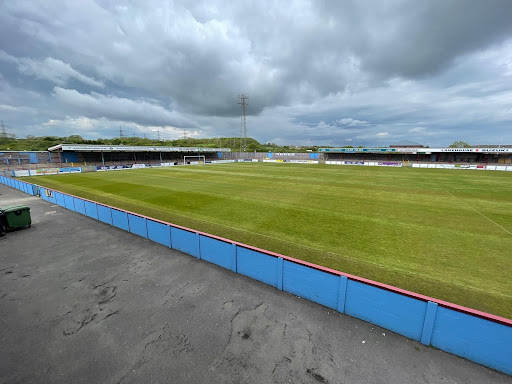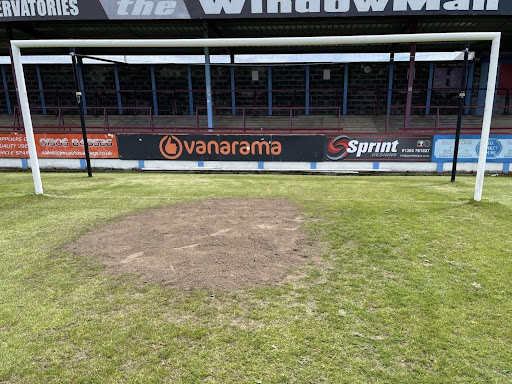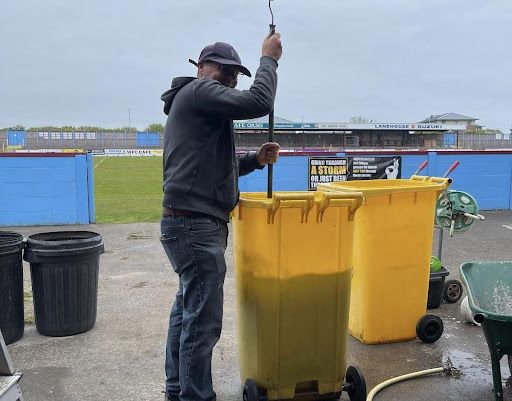Come rain, snow, sun or hail, there will always be someone working on a football pitch trying to get it ready before matchday. We talked to a few non-league groundsmen about their experiences and the struggles of working on football pitches at non-league level.
Every non-league fan has been there. Rain spattering down their windows, cracks of thunder, rolling on through the night. Sitting with a tea and perhaps some biscuits, watching the specks of lightning thinking, knowing, there is no way the game will be on tomorrow.
Despite this, you wake up the next morning, waiting for your club to finally post a graphic on social media, “game off”. But it doesn’t come. Instead, a different post pops up onto your screen, pitch inspection passed, the game is to go ahead.

And as you sit there later that day, in the bar huddled away as the rain continues to pour, watching the players are scurry through the mud, it’s easy to forget the people who were working to make sure the game could go ahead in the first place, the groundsmen.
“Essentially, we deal with all the shit really,” says Joe Cook, 24, a contractor who has been working on the pitch at Whitby Town for almost a year now.
“I came to watch my cousin play and thought, bloody hell, the pitch looks terrible and it just so happened that they were in need of a groundsman and so I offered my services.
“At this level of football, it’s really difficult with the lack of funding and money within the football club, so the machinery is all older than me, at times it can be an uphill battle.

“When you’ve been battling away against the elements though, and you get those games on and the fans and players come and shake your hand, there is pride there.”
And even for a contractor like Joe, it’s not all just about money at the end of the day, it is still about the community around the club.
“We have two or three volunteers who come out and help us and, for me personally, I don’t want to travel to watch the bigger clubs and games, it is much nicer to get down and support a local club and give back.
“Because I spend a lot more time here than I should as my wife would tell you.”
Despite the achievement, it is far from an easy battle. With one of the wettest winters we’ve had in recent times, Whitby Town unfortunately had to postpone 11 games due to standing water.
On one occasion, Joe and his team had to spend almost eight hours just slowly digging through snow, trying to make sure Whitby Town could play their game the following day. The club have also set up a JustGiving page, hoping to fundraise for a new drainage system under the pitch as well as a new sand-based turf to help with rain amongst a whole host of other improvements, helping Joe and the volunteers, because when games are called off, the groundsmen are the first people to be called out.
“There are some times when people on social media absolutely hammer you, never to your face but always online, so I have to try not to read any of those when the game is called off.
“However, when it is on, people are always your friend and there isn’t any bad mouthing, not to my face anyway, and as long as I don’t hear it, I don’t mind.
“And at the end of the day, safety is paramount, and it’s the referee’s call and we have to do what they say, even if we sometimes share different opinions on what’s safe and what isn’t safe.”
Work doesn’t stop, even in the summer months. When no football is being played there are still challenges to overcome, with groundsman, like Joe, spending the hot days trying to make sure the ground isn’t cracking, and the pitch is properly allowed to rest. Yet, there is one form of weather which really trumps it.
“There is all different pros and cons and it’s difficult to say one is really harder than the other,” he said.
“But, I have to say the rain.
“When it’s raining, we can’t get any machinery onto the pitch, and so we have to use push mowers, which is like a six-hour job for one person, the waterproofs are out and it’s definitely the least enjoyable.”
For Iain Stone, 55, at Weymouth F.C down in the far south of the country, it’s a different story, one still filled with just as much rain.
Iain has been a director of the Weymouth FC supporters trust and had been volunteering with the club for 15 years, but he had never really thought of stepping foot on the ground and helping get the pitch ready.
That changed after the Covid-19 pandemic.
With stadiums around the country sitting empty, they slowly became overgrown and teams like Weymouth FC needed volunteers to start clearing up all the emergency exits.
Iain, who had recently retired, went down to help and has now been helping work on the pitch ever since.
“For me, it’s just about helping the club, helping the manager as well as fitness and learning a new skill,” he said.
“I was a gas engineer and worked in marketing and commercially over the years and now retiring early has given me a chance to try this, something completely different.
“There is a team altogether of about six of us and it’s kind of a pride thing to look back and know you have done everything possible. Despite such a wet winter, we were lucky to only lose one first team men’s game to the weather.
“It really is a labour of love.”

For Iain though, right now, it is not just about the pitch.
From February 12 to March 26 2024, Iain has been walking 16 miles a week, totalling 96 miles to raise awareness for Epilepsy Action and for his granddaughter Gemma.
Gemma suffers from a rare condition called WWOX WOREE syndrome. The syndrome is caused by an extremely rare mutation of the WWOX gene and symptoms include epilepsy and severe cognitive impairment.
Children with the syndrome don’t live through adulthood, most don’t make it past four years old. Right now, there is no cure.
“The epilepsy nurse, who is funded through epilepsy action has been amazing with my son and his wife and I just really wanted to do something that could give back and help raise some money for them.
“I also want there to be more awareness for these conditions.”
Since starting his fundraiser, Iain has smashed his target, walking well over 100 miles now, despite recently fracturing his foot, and he is determined to push for more.
A lot of the miles can be attributed to the sheer work Iain puts into the pitch. Mowing the grass can add up to a whopping 29,000 steps, and then marking it out can sometimes be between 12,000 -14,000 as well. That’s just for a matchday with no weather involved, which can cause the step count to skyrocket.
Unlike other seasons, Weymouth FC have not just had their own games to worry about and prepare for. After being promoted, Hamworthy United could not play at their ground for the season, and Weymouth allowed them to groundshare for the year. This, on top of academy and women’s football games, means that volunteers can be asked to prepare the pitch for four games a week, totalling to over 50 in a season, something that can’t be done without a real community effort.
“I’ve enlisted previous groundsmen to come and help as and when. We have had some help as well which probably saved us three or four games this year with the local golf club.
“They came down and did a drain of the pitch for us which really helped. They also had a couple of greenkeeping experts there who helped give us advice, tips, and tricks to make sure we can do our job as best we can.”
“Really, we want to show what we do to help inspire others to give us a hand and come down to a game.”
Being a groundsman at a non-league club is far from an easy task. Working with machinery that would have been deemed old over 20 years ago. Slugging through the pouring rain pushing mowers through the grass, over and over, waterproof clinging against them. Dumping sand onto a pitch days before the game, hoping it soaks up the water enough for the match to be played, or spending hours out in the sun trying to make sure those lines are white and crisp. It may be hard work, but, when the fans come in to start singing their chants, when the players walk out onto the pitch, boots crunching on the grass and freshly drawn markings, it’s worth it.
But next time you are sitting at home, with those tea and biscuits huddled away from the rain, waiting with an eye roll for the graphic to come in that the game will be postponed. Sitting there wondering what on earth the groundsmen have even tried to do – the answer is, they probably tried quite a lot.
To help Whitby Town install drainage systems and a new pitch to keep more games on, or to help Iain Stone continue to fundraise for Epilepsy Action and his granddaughter Gemma, please click the two following links below.
https://www.justgiving.com/crowdfunding/whitby-town-pitch
https://www.justgiving.com/page/iain-stone-1707836501193gemma
Love Island stars who have played in non-league
By Zak Wright





